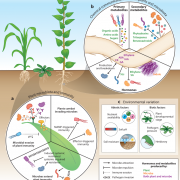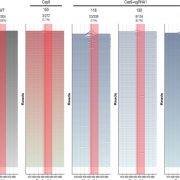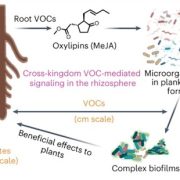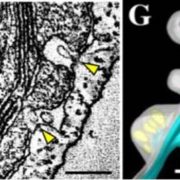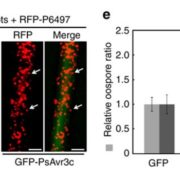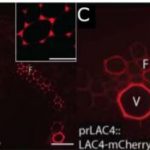Identification of a unique ZIP transporter involved in zinc uptake via the arbuscular mycorrhizal fungal pathway (bioRxiv)
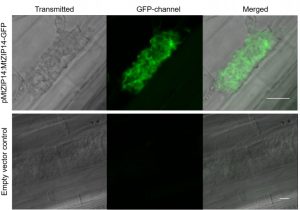 Last week, PSRW presented two review papers regarding host plant interactions with microbial populations, particularly for plant nutrient intake. Watt-Williams et al. utilize such knowledge for their paper, performing an RNA-seq dataset to identify a novel zinc transporter in Medicago truncatula. Zinc is a vital nutrient; its uptake in plants is commonly facilitated via associations with arbuscular mycorrhizal (AM) fungi. However, the plant’s molecular players in this fungi-plant-mediated zinc uptake are relatively uncharacterized. To untangle this complex process, the authors analyzed the transcriptomes of M. truncatula under varying levels of soil zinc concentrations, with or without AM association. One gene in particular, MtZIP14, was chosen for experimental analysis, as it was only expressed in AM-colonized root cells and had an expression pattern suggesting involvement in the zinc uptake pathway. MtZIP14 localizes to the peri-arbuscular membrane of AM-colonized cells, characteristic of a fungal-plant transporter, and demonstrates zinc transport ability when expressed in yeast. M. truncatula knock-down and knock-out mutants of MtZIP14 demonstrated altered expression of other ZIP genes, alongside decreased biomass, lower shoot zinc concentrations, and impaired AM colonization. These results open the gates towards better understanding how plants interact with their environment for their own well-being, information with sure agricultural and ecological applications. (Summary by Benjamin Jin) bioRxiv 10.1101/2020.09.28.317669
Last week, PSRW presented two review papers regarding host plant interactions with microbial populations, particularly for plant nutrient intake. Watt-Williams et al. utilize such knowledge for their paper, performing an RNA-seq dataset to identify a novel zinc transporter in Medicago truncatula. Zinc is a vital nutrient; its uptake in plants is commonly facilitated via associations with arbuscular mycorrhizal (AM) fungi. However, the plant’s molecular players in this fungi-plant-mediated zinc uptake are relatively uncharacterized. To untangle this complex process, the authors analyzed the transcriptomes of M. truncatula under varying levels of soil zinc concentrations, with or without AM association. One gene in particular, MtZIP14, was chosen for experimental analysis, as it was only expressed in AM-colonized root cells and had an expression pattern suggesting involvement in the zinc uptake pathway. MtZIP14 localizes to the peri-arbuscular membrane of AM-colonized cells, characteristic of a fungal-plant transporter, and demonstrates zinc transport ability when expressed in yeast. M. truncatula knock-down and knock-out mutants of MtZIP14 demonstrated altered expression of other ZIP genes, alongside decreased biomass, lower shoot zinc concentrations, and impaired AM colonization. These results open the gates towards better understanding how plants interact with their environment for their own well-being, information with sure agricultural and ecological applications. (Summary by Benjamin Jin) bioRxiv 10.1101/2020.09.28.317669


